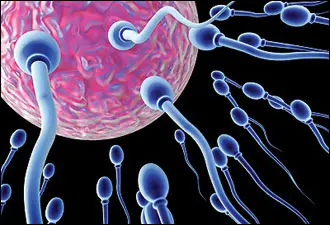The main symptom of infertility is failure to become pregnant. Some infertile women may have irregular menstrual cycles or not have menstrual periods. Some men may show symptoms of hormonal problems, such as changes in hair growth or sexual ability.
The couple must be careful to carry out all the steps during ovulation and fertilization correctly so that you can become pregnant. Ovulation is the release of an egg from one of the ovaries, and fertilization occurs when the sperm and egg unite to form the embryo that becomes a fetus during pregnancy. Sometimes, problems that cause infertility in couples are present. From birth and sometimes, these problems occur later in life.
Causes of infertility may affect one or both spouses, and in some cases, no cause can be identified.
Among the causes of poor fertility in males:
Conditions that can affect the amount or quality of sperm production and may include undescended testicles, genetic defects, hormonal problems, and health problems such as diabetes.
Sperm can also be affected by certain infections, such as chlamydia, gonorrhea, mumps, or HIV. Enlarged veins in the scrotum (varicocele) also affect sperm quality.
Problems with sperm reaching the female reproductive tract. These problems may be caused by sexual diseases, such as premature ejaculation, certain genetic diseases, such as cystic fibrosis, or organic problems, such as testicular blockage, or damage or injury to the reproductive organs.
Certain environmental factors: Exposure to pesticides, other chemicals or radiation can affect fertility, as can medications that treat bacterial infections of all kinds, high blood pressure, and depression. If the testicles are repeatedly exposed to heat, as is the case with saunas or hot tubs, it may affect This is due to the ability of the testicle to produce sperm.
Damage related to cancer and its treatment Cancer treatments such as chemotherapy and radiotherapy may affect sperm production.
Causes of female infertility:
Ovulation disorders These conditions affect the release of eggs from the ovaries and include hormone problems such as polycystic ovary syndrome. High levels of a hormone needed to produce breast milk, called prolactin, may also have an effect on ovulation. Having too much thyroid hormone (called hyperthyroidism) or too little (called hypothyroidism) can affect the menstrual cycle or cause infertility.
Other underlying causes may include excessive exercise, appetite disorders, or tumors.
Uterine diseases. These include tumors called uterine polyps, problems with the shape of the uterus, or problems in its lower end called the cervix. Tumors in the wall of the uterus – called uterine fibroids – may also cause infertility, but they are not cancer. Fibroids can block the fallopian tubes, the site where the egg and sperm combine, and can also prevent the fertilized egg from attaching to the uterus, which is what must happen for the fetus to develop.
Fallopian tube damage or blockage These problems are often caused by swelling of the fallopian tube, called salpingitis. This swelling is caused by an infection of the female reproductive organs called pelvic inflammatory disease.
Endometriosis: In this pathological condition, tissue similar to the tissue of the inner uterine lining grows outside the uterus, and this may affect the functions of the ovaries, uterus, and fallopian tubes.
Primary ovarian insufficiency Primary ovarian insufficiency occurs when the ovaries stop performing their normal functions and menstruation stops before the age of 40 years. The cause is often unknown, but there are factors associated with primary ovarian insufficiency. These include diseases of the immune system, some genetic conditions such as Turner syndrome, and radiation therapy or chemotherapy.
Pelvic adhesions are collections of scar tissue that connect organs. They can form after pelvic infections, appendicitis, endometriosis, or surgery in the abdomen or pelvis.
Cancers and their treatment Some types of cancer – especially types that affect the reproductive organs – often reduce female fertility, and radiation therapy and chemotherapy may also affect fertility.

